Book contents
- Frontmatter
- Contents
- List of Figures and Tables
- Acknowledgements
- Notes on the Contributors
- 1 Introduction Scotland's Muslims: Early Settlement, Current Context and Research Themes
- 2 Health The Health Profile of Muslims in Scotland
- 3 Education Educational Outcomes of Muslim Pupils in Scotland and Parents' Mobilisation of Different Forms of Capital
- 4 Political Participation Young Muslims' Political Interests and Political Participation in Scotland
- 5 Gender and Migration The Role of the ‘Other’ Woman in Shaping the Subjectivities of Recent Muslim Migrant Women to Scotland
- 6 Sexuality Scottish Muslim Gay Men and the Troubling Intersection of Sexuality and Religion
- 7 Young People Muslim Youth in Scotland: Politics, Identity and Multicultural Citizenship
- 8 Generational Relations Gender and Generational Relations for Muslim Women in Scotland
- 9 Heritage Feeling Scottish and Being Muslim: Findings from the Colourful Heritage Project
- 10 Multiculturalism Multiculturalism and Scotland: ‘Bringing the Outside into the Middle’
- 11 Media Muslim Engagement with the Mainstream Media in a Scottish Context
- 12 Representation Representing Islam at the Edinburgh International Book Festival
- 13 Integration Halal Scots: Muslims' Social Integration in Scotland
- Index
11 - Media Muslim Engagement with the Mainstream Media in a Scottish Context
Published online by Cambridge University Press: 23 June 2018
- Frontmatter
- Contents
- List of Figures and Tables
- Acknowledgements
- Notes on the Contributors
- 1 Introduction Scotland's Muslims: Early Settlement, Current Context and Research Themes
- 2 Health The Health Profile of Muslims in Scotland
- 3 Education Educational Outcomes of Muslim Pupils in Scotland and Parents' Mobilisation of Different Forms of Capital
- 4 Political Participation Young Muslims' Political Interests and Political Participation in Scotland
- 5 Gender and Migration The Role of the ‘Other’ Woman in Shaping the Subjectivities of Recent Muslim Migrant Women to Scotland
- 6 Sexuality Scottish Muslim Gay Men and the Troubling Intersection of Sexuality and Religion
- 7 Young People Muslim Youth in Scotland: Politics, Identity and Multicultural Citizenship
- 8 Generational Relations Gender and Generational Relations for Muslim Women in Scotland
- 9 Heritage Feeling Scottish and Being Muslim: Findings from the Colourful Heritage Project
- 10 Multiculturalism Multiculturalism and Scotland: ‘Bringing the Outside into the Middle’
- 11 Media Muslim Engagement with the Mainstream Media in a Scottish Context
- 12 Representation Representing Islam at the Edinburgh International Book Festival
- 13 Integration Halal Scots: Muslims' Social Integration in Scotland
- Index
Summary
INTRODUCTION
Muslims are a subsidiary concern for religion reporting in Scotland's news media. If journalists must cover religion, issues pertaining to Christian sectarianism still occupy a central focus, although, as more Scots identify with no religion, news reports take on a memorialising tone, marking religion's decline. Sometimes these storylines merge, as was the case with the biggest religion story in the news during my research about Muslims and the news media in Scotland: the revelation of the sexual abuse of several priests by Cardinal Keith O'Brien (Deveney, 2013). The dominant Scottish story overall was the preparation for the referendum on independence. Muslims played a humble part in coverage of the second story and no part at all in the first.
Muslims are not ignored by the Scottish media, however. The relationship is characterised by a kind of benign neglect. By this, I do not mean that Muslims are neglected by the media in a way that allows them to flourish through a lack of interference. Journalists often report ‘bad news’ (Glasgow University Media Group, 1976), and being off the front page or the evening line-up certainly means that fewer bad things are said about you. In that sense, as the adage goes, no news is good news. But to be neglected by the media is not necessarily a positive or helpful state: scholars note the pervasive presence of media in our modern world – a presence sometimes described as ‘mediatisation’ (Hjavard, 2013; Deacon and Stanyer, 2014). At a conceptual level, the priorities of the media can leak into other fields. In a more practical sense, coverage in the media can help your organisation achieve its goals, and publicity carries currency – Pierre Bourdieu (1986) uses the term ‘capital’ to describe not only economic but social and cultural qualities that can be usefully converted into specific advantages. In this sense, the fact of being someone whom journalists turn to for information for the news confers social capital on the person or the institution that becomes a source. Taken together, we can say that if you are not ‘in’ the media, then you are not ‘in’ society in a particular and important way. Nick Couldry (2012) takes this further, talking of the ‘hidden injuries’ of media representation, by which people determine themselves powerless before an all-encompassing media world.
- Type
- Chapter
- Information
- Scotland's MuslimsSociety, Politics and Identity, pp. 218 - 235Publisher: Edinburgh University PressPrint publication year: 2017



